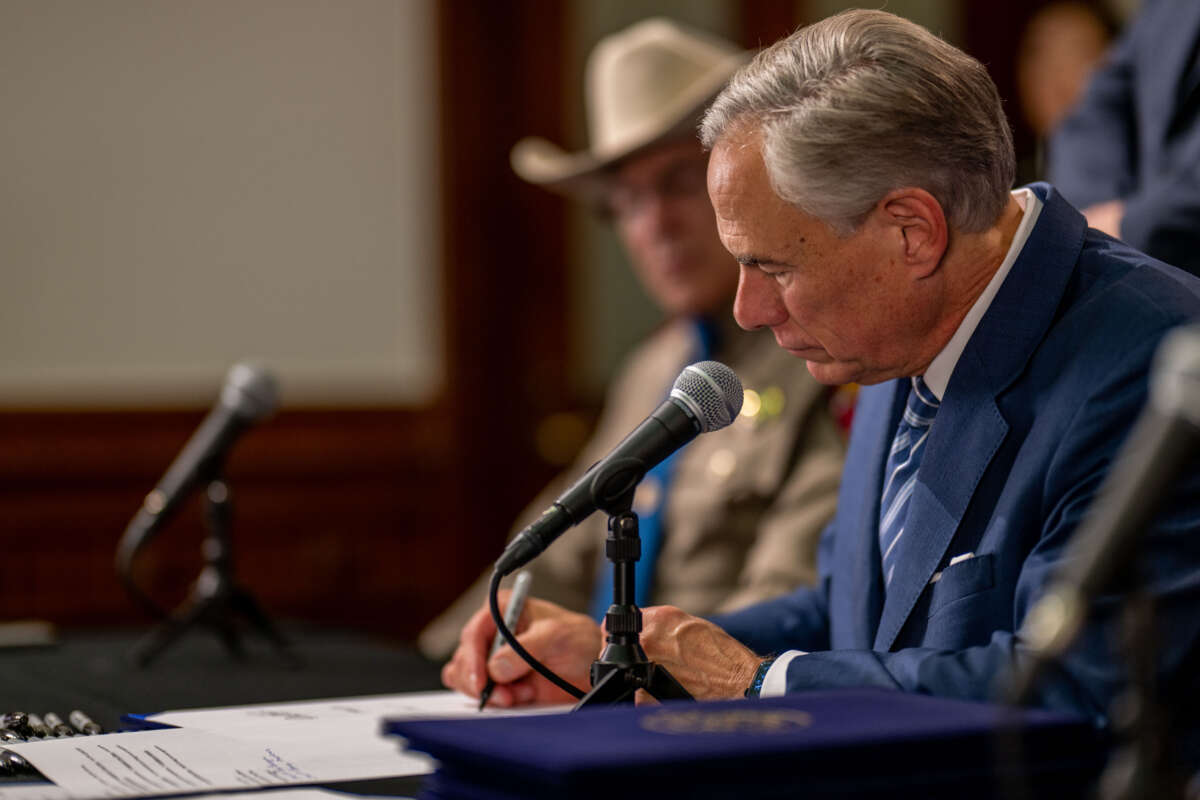Honest, paywall-free news is rare. Please support our boldly independent journalism with a donation of any size.
Republican Texas Gov. Greg Abbott continued his anti-migrant crusade on Monday with plans for a Brownsville signing ceremony for a pair of state bills that legal experts and rights groups say are dangerous and violate the U.S. Constitution.
Senate Bill 3 allocates $1,540,000,000 for border security, including constructing contested new barriers to limit undocumented immigration from Mexico and helping communities enforce S.B. 4. As the ACLU of Texas explained, that bill “authorizes any and all law enforcement to arrest, and judges to order removed, anyone suspected of having entered Texas without papers.” It also creates a state crime for unlawfully entering Texas from a foreign country — punishable by up to six months in jail or a $2,000 fine.
Domingo Garcia, national president of the League of United Latin American Citizens, said Monday that “LULAC denounces in the strongest terms possible the actions in Brownsville today of Gov. Greg Abbott and his supporters in the Texas Legislature.”
“These individuals are determined to weaponize their legislative power for political gain at the expense of human beings,” Garcia added. “Instead of working with Democrats in the Texas Legislature on a genuine solution, so-called Republican Christians are hypocritically turning their backs on the defenseless and aiding drug cartels and human smugglers profiting from the desperation of men, women, and children.”
Krish O’Mara Vignarajah, president and CEO of Lutheran Immigration and Refugee Service — which assists migrants in communities including Dallas, Fort Worth, and San Antonio — declared that “these measures not only threaten the safety and dignity of asylum-seekers, but also risk undermining the foundational principles of our legal system.”
“Immigration is clearly a federal authority, and this legislation knowingly dances on the edge of constitutional cliffs at the expense of vulnerable children and families,” Vignarajah continued. “By criminalizing the very act of seeking refuge, Texas is turning its back on the values of compassion and due process that make our nation the world’s beacon of humanitarian leadership.”
“S.B. 4 represents a recipe for racial profiling, making ethnicity a shortcut to suspicion,” she warned. “These new measures will not rebuild trust among immigrant communities that have long grappled with the specter of detention and deportation. To the contrary, they are poised to create a chilling effect, deterring immigrants from seeking necessary assistance or cooperating with law enforcement, and jeopardizing the safety and cohesion of Texan communities as a whole.”
Other critics have shared similar warnings. Jennifer Babaie, director of advocacy and legal services at Las Americas Immigrant Advocacy Center, said earlier this month that “S.B. 4 violates the constitutional rights of individuals, disregards the safety of Texas communities, and encourages racial profiling and discrimination against people of color.”
Tsion Gurmu, legal director at the Black Alliance for Just Immigration, emphasized that “Black and Brown people, regardless of citizenship, are already racially profiled and over-policed.”
We called out #SB4 for the horrific legal implications it poses to undocumented migrants. This legislation would be an abuse of power that would allow law enforcement officers to arrest undocumented individuals and further militarize our immigration system https://t.co/kgUpycyJYB pic.twitter.com/ezv4nEfk03
— Texas Civil Rights Project (@TXCivilRights) December 15, 2023
ACLU of Texas legal director Adriana Piñon argued that “the suffering Texas leadership is willing to inflict on immigrants in their effort to override federal immigration law should give all Texans, regardless of background or party affiliation, reason for concern.”
Dylan Corbett (no relation), executive director at the Hope Border Institute, said that S.B. 4 “effectively solidifies” Operation Lone Star, a joint effort between the state’s Military and Public Safety departments that Abbott launched in 2021, and “Texas’ war footing at the border indefinitely.”
U.S. President Joe Biden’s administration “needs to take far more active and aggressive action to push back on this law and the entire constitutionally dubious Operation Lone Star,” Corbett added.
Vignarajah also urged the federal government “to intervene and ensure that these deeply harmful and unconstitutional policies are reversed.”
While the U.S. Department of Justice did sue earlier this year over buoy barrier “death traps” that the Abbott administration installed in the Rio Grande, migrant rights advocates on Capitol Hill are worried that Biden — who is seeking reelection next year — may soon make concessions to Republican members of Congress on federal aimmigration policy.
Even if Biden doesn’t challenge S.B. 4, the law may not stand.
#SB4 will let police detain people over "suspicions" about their immigration status — an invitation to further racial profiling and harassment of Black and Brown Texans.
— ACLU of Texas (@ACLUTx) December 17, 2023
This is unconstitutional.
If #SB4 is signed into law, we will sue.https://t.co/5fqitPJxI3
The Dallas Morning News reported that “the sweeping and controversial proposal, once signed, is scheduled to take effect in early 2024 but some civil rights groups have already said they would file a lawsuit over the bill — which is likely destined to reach the U.S. Supreme Court.“
While the nation’s highest court has a right-wing supermajority, legal criticism of the bill has been bipartisan. The newspaper noted that “dozens of former federal immigration judges — appointed by both Democrat and Republican presidents — have also criticized the measure and penned a letter last month saying the bill violates federal law.”
Babaie said in early December that “organizations across Texas are prepared to use all available resources to safeguard Texas families from S.B. 4’s inherent violations of civil rights. We will not back down.”
Media that fights fascism
Truthout is funded almost entirely by readers — that’s why we can speak truth to power and cut against the mainstream narrative. But independent journalists at Truthout face mounting political repression under Trump.
We rely on your support to survive McCarthyist censorship. Please make a tax-deductible one-time or monthly donation.
